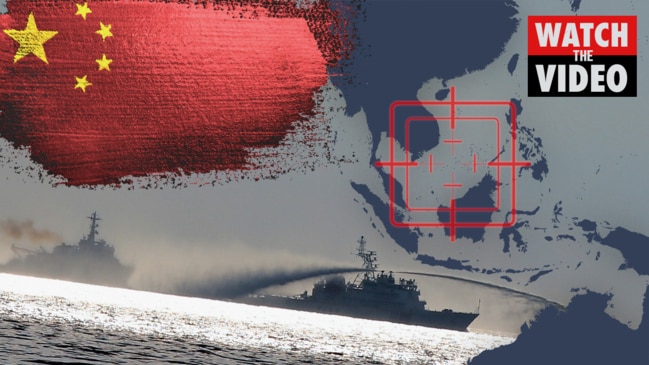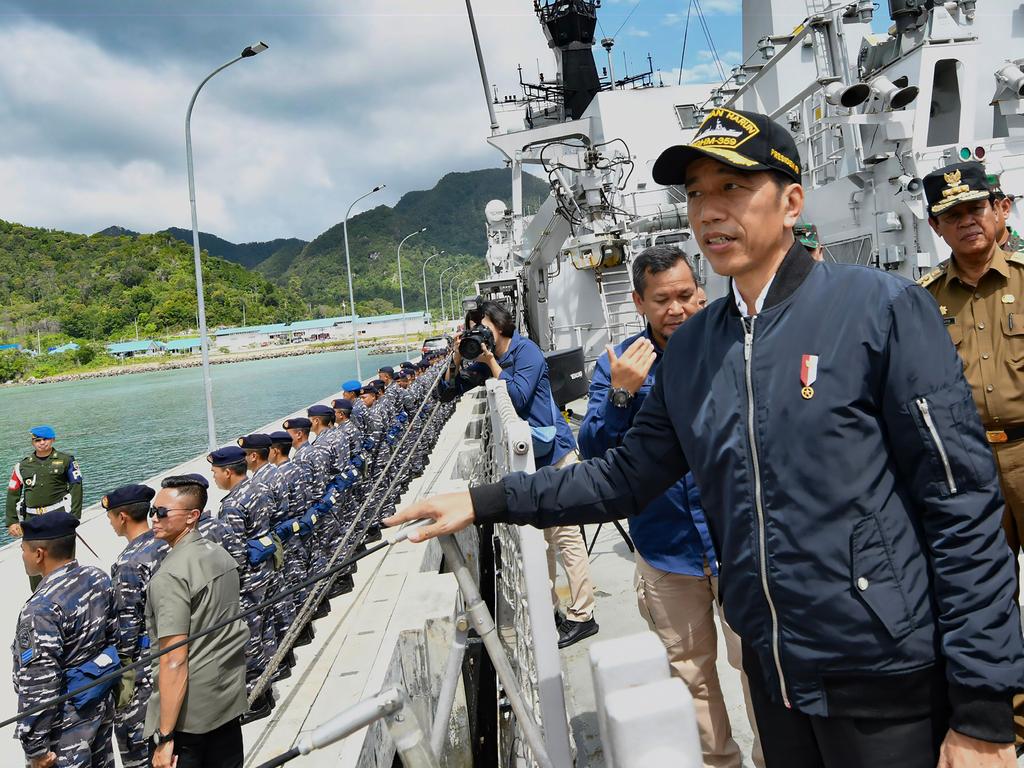South China Sea: Indonesia on high alert after appearance of Chinese vessel
Patrols have been mobilised after China was accused of a bold move with a coast guard vessel, sparking a tense South China Sea dispute.

A Chinese coast guard vessel has imposed itself in Indonesian waters – some 1500km from mainland China – insisting the area belongs to Beijing. Now Indonesia is mobilising more patrols to expel unwanted intruders.
And this is just the latest move in an escalating fight to secure rapidly diminishing food stocks, international analysts warn.
Natuna Island was the centre of a tense standoff between the two nations in January.
Earlier this week, Chinese Coast Guard cutter 5204 entered Indonesia’s 320km exclusive economic zone (EEZ).
While international law permits ‘innocent passage’ through an EEZ, Indonesian government officials say the Chinese vessel was not behaving innocently.
“Because this one halted, then went circling, we became suspicious, we approached it and learned that it was a Chinese coastguard vessel,” the chief of Indonesia’s maritime security agency, Bakamla, told local media.
RELATED: Tiny island is a thorn in China’s side

Beijing immediately upped the ante.
A Foreign Ministry spokesman said the 2700 tonne Zhaojun-Class coast guard vessel was conducting “normal patrol duties in waters under Chinese jurisdiction”.
“China’s rights and interests in the relevant waters in the South China Sea are clear,” he said.
But Natuna Island is some 1700km south of China’s southernmost province, Hainan Island. And the entirety of the disputed South China Sea – along with Malaysia, the Philippines and Vietnam – lay between the two.
RELATED: Secret military ‘submarine cave’ revealed

Indonesia’s government says China’s territorial claims are unilateral and without legal basis. A Permanent Court of Arbitration in 2016 found that, under the UN Law of the Sea (UNCLOS), China’s “nine-dash line” claim was invalid and without historical foundation.
Beijing insists the ruling was itself illegal.
‘LITTLE TRICKS’
China’s Communist Party-controlled news agency The Global Times alleges Indonesia has “gotten up to little tricks on the South China Sea”.
Jakarta and Beijing stared each other down for several months over the Christmas, New Year period. Chinese fishing boats, under the direction of a coast guard vessel, repeatedly entered Vietnamese and Indonesian territory in the northern Natuna Sea.
Jakarta responded by sending eight patrol ships, scrambling F-16 fighter jets and organising its own fishing fleet to assist with surveillance.
In May, Jakarta sent a formal note of complaint to the UN Secretary-General stating that Beijing was not respecting the court ruling.
But China, a signatory to the UNCLOS treaty, insists the law of the sea does not apply – and that the tribunal’s ruling was “illegal”.
CCG vessel 5204 has left Indonesia EEZ this afternoon after KN Pulau Nipah 321 continues to shadow the vessel with the backup of KRI Imam Bonjol 383.
— Janet Dyah Ekawati G (@JanetDEGibson) September 14, 2020
Prior to this, both sides were involved in intense comms via radio, each underlining their respective claims in the waters. pic.twitter.com/JPqOnjBbhw
The Global Times goes on to complain: “The proposal that marine disputes should be resolved in accordance with the UNCLOS is actually unreasonable.”
China’s Foreign Ministry says it does not claim Natuna Island itself. Instead, it claims the rich fishing grounds to its north and east. But it refuses to specify the exact coordinates of this arbitrary boundary.
Jakarta argues those waters are Indonesian under the exclusive economic zone provisions of UNCLOS based on its ownership of Natuna.
Amid the standoff, Beijing’s Global Times has pointedly referred to Indonesia’s limited ability to defend its territory.
“Defence budget cuts have weakened the country’s military capability in the South China Sea including Natuna Islands,” the article reads.
“This will reduce the number and frequency of Indonesian navy cruises, patrols, and military drills. Indonesia’s military and police systems are worried that the country will lose its previous strength to safeguard its rights at sea.”
Beijing’s foreign ministry made its intentions clear in January: “Whether the Indonesian side accepts it or not, nothing will change the fact that China has rights and interests over the relevant waters.”
HIGH STAKES
Indonesian Foreign Ministry spokesman Teuku Faizasyah has asked the Chinese embassy in Jakarta to explain the coast guard vessel’s actions.
“We reiterated to the Chinese deputy ambassador that Indonesia’s exclusive economic zone does not overlap with Chinese waters,” Faizasyah said.
The incursion has military overtones.
The Chinese Coast Guard is not a civilian police enforcement agency. Instead, it is controlled by the PLA Navy.
And international analysts say China’s fishing fleet is also not a civilian enterprise. It is a State-controlled militia co-ordinated by political commissars and trained to operate in concert with the People’s Liberation Army (PLA).
“In many locations, the CCG/People’s Liberation Army (PLA) Navy are trying to normalise the presence of their ships and then eventually move into enforcing their fishing rights and the nine-dash line,” a naval analyst told Asia Times.
Jakarta, for its part, refuses even to accept there is a debate – insisting its stance is entirely defined by international law. It has also repeatedly called on China and the United States to stop trying to make it take sides in their disputes.
“This latest development merely highlights the persistent problem Indonesia faces with China refusing to relent on its irredentist claims in the South China Sea,” says Singapore-based Institute of Defence and Strategic Studies researcher Collin Koh.
“Instead of seeing China as more aggressive, perhaps it’s more accurate to describe China as being ‘still aggressive’ despite the last standoff.”
HUNGER GAMES
The region’s strained fish stocks are at the heart of the South China Sea tensions.
“China and Vietnam have polluted their coast and coastal waterways, traditional fishing grounds (and) overfished, so the most lucrative fishing is in the south,” UNSW emeritus professor Carl Thayer told Voice of America.
But Chinese fishing militia have been staking claims on new areas across the Indo-Pacific.
Some 300 boats, supported by coast guard vessels, earlier this year swarmed the Galapagos Islands in search of a squid catch.
Observers say the boats have been turning off their location beacons to fish within the international marine reserve illegally.
“This massive and ongoing fishing effort of China’s fleet threatens the Galapagos Islands, the rare species that only call it home and everyone that depends on it for food and livelihoods,” says Oceana fishing analyst Dr Marla Valentine.
“The situation playing out in the Galapagos should raise serious questions and concerns about the impact China’s massive fishing fleet is having on the oceans it sails.”
Chinese fishing fleets have also been implicated in the ongoing appearance of ‘ghost ships’ – North Korean vessels washed up on the shores of Japan with dead or no crews.
International analysts have begun questioning whether Beijing is having difficulties feeding its 1.4 billion citizens.
Recent measures such as public campaigns against gluttony and food waste come on the back of widespread floods, mass culls among the nation’s pig and chicken farms to combat virus outbreaks, insect plagues and rising import prices. And the artificial island fortresses of the South China Sea – the cause of immense international tension – were built on what were crucial fish spawning grounds.
“It’s too early to gauge the ultimate severity of China’s total food woes, and it’s highly unlikely that the ripple effects of China’s food issues will cascade through the global food chain, but right now Chinese leadership has food security as a top concern,” argues commodities analyst Sal Gilbertie.
Jamie Seidel is a freelance writer | @JamieSeidel




